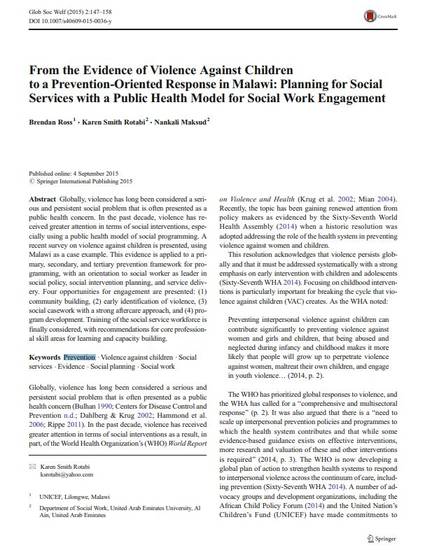
Article
From the Evidence of Violence Against Children to a Prevention-Oriented Response in Malawi: Planning for Social Services with a Public Health Model for Social Work Engagement
Global Social Welfare
(2015)
Abstract
Globally, violence has long been considered a serious and persistent social problem that is often presented as a public health concern. In the past decade, violence has received greater attention in terms of social interventions, especially using a public health model of social programming. A recent survey on violence against children is presented, using Malawi as a case example. This evidence is applied to a primary, secondary, and tertiary prevention framework for programming, with an orientation to social worker as leader in social policy, social intervention planning, and service delivery. Four opportunities for engagement are presented: (1) community building, (2) early identification of violence, (3) social casework with a strong aftercare approach, and (4) program development. Training of the social service workforce is finally considered, with recommendations for core professional skill areas for learning and capacity building.
Keywords
- Prevention,
- Violence against children,
- Social services,
- Evidence,
- Social planning,
- Social work
Disciplines
Publication Date
December, 2015
DOI
10.1007/s40609-015-0036-y
Citation Information
Brendan Ross, Karen Smith Rotabi and Nankali Maksud. "From the Evidence of Violence Against Children to a Prevention-Oriented Response in Malawi: Planning for Social Services with a Public Health Model for Social Work Engagement" Global Social Welfare Vol. 2 Iss. 4 (2015) p. 147 - 158 Available at: http://works.bepress.com/karen-rotabi/7/
